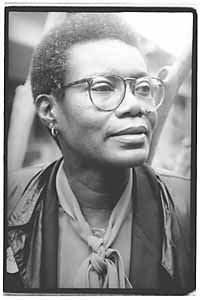https://www.austinchronicle.com/arts/1999-06-18/522204/
Canis Interruptus
The Applicants
June 18, 1999, Arts
|
|
Chinwe Odeluga
Individual artist integrating video and poetry
Discipline: Mixed Arts
Years funded: First-year applicant
"I'm trying to make lemonade out of lemons," says Chinwe Odeluga shortly after her allocation session. Odeluga applied for $10,000 from the Mixed Arts panel for her video project Poetic Healings. She received $3,900. Odeluga says she knew that as a first-time applicant, her chances of receiving the full amount she requested were slim, but she felt that "the tone [in the allocation session] was more for the groups that were already established, not the underdog. I was hoping to get at least 50%." To redress the issue, Odeluga will present her case (along with many other artists) to the Arts Commission, where she hopes her allocation will be increased "a couple hundred or even a thousand dollars. Anything will help."
Without sufficient funding, Odeluga's whole project will have to change scale. Originally, Odeluga had wanted her video about health issues relating to lesbians of color to be an hour long. At the level of funding she received from the city, she has only enough to make a 12-minute sampler. Despite the low allocation, Odeluga remains optimistic: "I'll get enough to get the sampler done, and that will be a good tool for further funding. I am from the Sixties time period, so I'm used to grassroots organizations. I will continue to apply to other sources of funding, but if push comes to shove, in order to get this done, I'll start passing the hat or be on the street corner with one of those signs. I'm not a baker, so I can't do a bake sale, but I'll think of something. Poetic Healings will get made."
Sam Coronado
Independent Visual Artist
Discipline: Visual Arts
Years Funded: 6
"No," says Sam Coronado. "I didn't get what I asked for." After steadily receiving increases in his Cultural Contracts funding for several years, Coronado saw his funding cut almost 25% this year. Even though cultural contracts funding is always a guessing game and cuts are always expected, when it happens it still hurts. "Some years are better than others," says Coronado, who purchased a building last fall and for whom every penny of funding counts.
The irony here is that this year, Coronado's Serie Project, which has always been among the top 10 projects when applications in the Visual Arts category have been rated, was one of the top five projects. But Coronado knows that other new and interesting projects are competing for the same pie that been spread around as much as possible.
"We just got to roll with the punches and do the best we can with what we get," the artist says. "That's why we're constantly trying to become independent, self-reliant, so we don't have to depend so much on city funds."
These days Coronado is focusing more and more on the marketing aspect of art. He recently explored having a marketing company distribute his work, but that venture fell through. For now, he's putting more effort on building his Web site and getting business through the Internet. "In the long term, we're probably going to have to market our work through our tours and conferences, things like that," he explains. "There's always a Plan B and Plan C to fall back on when these things happen."
Jason Neulander
Artistic Director, Salvage Vanguard Theater
Discipline: Theatre
Years funded: 4
Neulander's Salvage Vanguard Theater was allocated $23,500 from the city this year, which is a slight increase over last year, but not nearly the $32,500 the director had hoped to receive. "It's a weird situation," Neulander says, "because we got funded a little more than last year -- so we're not in this dire emergency situation -- but where we are in a dire situation is that the city is not responding to our growth."
In an effort to change the city's response, Neulander will lobby the Arts Commission for an increase. He won't, however, go through the Cultural Contracts' formal appeal process. The artistic director says his strategy to increase SVT's allocation is "basically that I drafted a letter to the commission outlining the points I think the panel missed. What we're looking for in our increase is going toward administrative support, which is a reflection of the company's growth, and our youth outreach program. So, by funding us ostensibly at what we got last year, the city has neglected our corporate longevity and the city's youths."
According to Neulander, the problem with the allocation session is that "when the panel made the allocation, they were looking at the total figures, not specifically at what the money is paying for." By explaining to the commission exactly what the extra money is for, Neulander hopes to get closer to Salvage Vanguard's full request. "And if we don't get it this year," Neulander concludes, "we'll try and get it next year. The amazing thing about the city is that they will fund you year after year after year; there's no foundation in the world that will do that."
The Panelists
Lois Jebo
Dance Panelist, Panel Chair
Panel Chair Lois Jebo was dispirited after the Dance Panel allocation session: "It was difficult because we had 35% more applicants than last year and a little less money ($400,051) to give out." The result? Several established applicants were not funded at the same level as last year.
The Dance Panel was not alone. Jebo says that "practically all the panels were in the same position. It is frustrating knowing that we had good quality applicants that need to and want to build their organizations, but that we were unable to fund that growth. Does the panel understand how this decrease in funding affects an organization? Yes, we do, but unfortunately we have to make those decisions."
Jebo said she saw a lot of organizations trying to grow this year, but she believes "the city of Austin cannot fund big growth spurts from establishedgroups. We can only validate that growth by giving them a slight increase that might make it possible to leverage funding from other sources. One of the things we heard a lot of this year was that groups want to pay their dancers, but unfortunately there just aren't enough funds to do that. We know groups can do better work if they can pay people to be full-time dancers, but the reality is that there will probably never be enough city money to fund that.
"The only positive aspect of this," Jebo notes, "is that perhaps the lack of (city) funding will really push organizations to get out into the private sector more." And the private sector is where Jebo hopes arts groups can help find the support they need to grow. Unfortunately, Jebo says, "we don't see the corporate world in Austin really funding emerging artists well. There are so few big companies that will actually invest in smaller arts organizations; we see them endowing museums but not anything much below that. I keep urging our artists to go to smaller businesses, because part of the reason some of them located in Austin was for the rich cultural heritage we have here, so there is a role for them in supporting the smaller artists."
Letty Chavarria
Music Panel
First-year Music Panelist Letty Chavarria says she learned a lot from the review sessions, even though the process was difficult and very time-consuming. "I tried to give special attention to every application that came through and really connect with the applicant," she says. "But it was a hard thing because we had more applicants than we did money and you can only divide a pie into so many slices. It was heart-wrenching. You wanted to give everybody exactly what they asked for, but it was really, really impossible."
For the Music panelists, the only logical way to spread around the bucks was to shave dollars from the amounts for existing organizations or established artists with a history of receiving city funding for their projects.
Chavarria explained that she looked at the ranking the applicant received from the city, the scoring the applicant received at the review, and the project itself to determine an overall ranking. It was difficult balancing the scores against the available funding: "We all got together and we had to tally the averages, then we had to sit there and duke it out on every single applicant as far as who was going to get what. We might say, 'Okay, this applicant didn't notify us, we don't know what they did with last year's money,' so that might be one of the people that got sheared off a little bit. I know some people felt, 'Gosh, why did they cut me?' but you have to look at it in a logistical manner; you can only spread the money so far. It was really, really analyzing those averages based on what they requested, then the whole panel had to finally decide on an absolute number."
Despite the time involved and the difficulty of the decisions to be made, Chavarria still feels the Cultural Contracts process in place is pretty good and probably the only way so many applicants in so many different disciplines could be served. Still, she would have liked more time before the review process to look over the applications and understand them better.
Chelby King
|
|
Arts Commission Chair
Chelby King worries about the arts organizations that were cut due to a smaller budget this year. But she holds out hope for many of those that were cut -- the Arts Commission doesn't yet know the final amount that it will receive from the city. "That will determine how we will do our contingency allocation," says King. "If we get a little bit of money, that's a big problem. If we have a lot of money, there's still some problem but it won't be bad because we have more money to address it with. The process we use to go about allocating funding needs to take into consideration the huge cuts that are made to organizations; we need to figure out a way to address that within a certain process instead of doing it randomly. We take ranking into consideration and some [organizations] have been cut by $10,000-$20,000 -- that's significant to them. We want to do it according to ranking."
King states that she has the utmost confidence in her panelists and feels they are well-qualified to make the decisions they are making about peoples' careers. And she says that having more panelists this year also made her feel that their scores were fair. "Last year, some of the panels had only one or two panelists, which means that decisions and scores are made by those few people. This year, there's more heads and more expertise making the decisions."
Even though King felt better about this year's process, she felt she should have done some things differently, especially during the review sessions. "There were times when I felt I should have provided clarification when something wasn't clear," she says. "I sit in on the panel process as an observer. [I'm] not really there to say anything, but there were times in hindsight when I feel I could have made some comments to clarify issues that would have helped people feel less frustrated. I know that strictly by the rules arts commissioners are there to observe and to make sure that the rules are abided by, but I wished that I had spoken up and clarified some things because sometimes misinformation gets in the way and it can be a mess."
Copyright © 2024 Austin Chronicle Corporation. All rights reserved.


